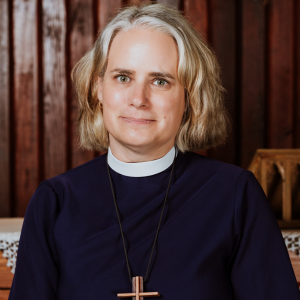The church, over the centuries, has held and continues to hold many different theories of atonement. Most of these theories centre around how Jesus’ death and resurrection were salvific. It was shocking that God incarnate was crucified by the Empire and resurrected in bodily form, and people struggled, and continue to struggle, with what this means.
While we all have different understandings of the saving power of Christ’s life, death and resurrection, and while none of these understandings will ever be complete, I think one of the major things we need to pay attention to is whether it is individual or corporate.
The early understandings of atonement and salvation held by the church were corporate. Christ’s death and resurrection was saving for all of humanity. Christ’s death and resurrection defeated evil and death in a very real way and that altered the shape of reality for all people.
However, over the centuries, there was a shift in some circles to a more individual understanding of salvation. Anselm, who served as Archbishop of Canterbury from 1093 to 1109, was hugely influential in what is now termed “substitutionary atonement,” the idea that Christ’s death was a substitute for the death of others.
While Anselm understood this in a corporate sense (i.e. Christ saved all of us from sin and death), the Reformation initiated the move to a more individualistic understanding of salvation, in which it is up to each individual to accept Jesus Christ as their personal Lord and saviour in order to be saved. The Enlightenment’s “I think therefore I am” creeped into theology and became, “I believe therefore I am saved.”
In July 2009 then-Presiding Bishop Katharine Jefferts Schori of The Episcopal Church spoke of the “heresy of individual salvation.” She upset some evangelical folk in saying this, but I think her words were prophetic in pointing out that we are never — as Christians or as humans — ever saved alone.
We are mid-way through the turbulent 2020s, and the interconnectedness of the world is glaringly obvious. It matters who is or is not elected in neighbouring countries. It matters what wars are being waged, and which children are suffering, in other countries. It matters what pollutants are being released into our air, soil and water. The idea that any one of us can be saved while the world burns and children suffer is non-sensical.
I don’t pretend to have a perfect theory of atonement. But I have always been helped by remembering that the word “atonement” is “at-one-ment.” I believe we will only be saved when all of humanity lives “at-one” with one another and with all of creation.
In April, Catherine Keller will be at the cathedral for this year’s John Albert Hall lectures. I hope you can join us for that event, either in person or by livestream. Catherine is a remarkable theologian and has much to offer us.
In March, the diocesan book study group read Catherine’s book No Matter What: Crisis and the Spirit of Planetary Possibility. In one of the chapters they looked at to prepare for her visit, “Creeps of the Apocalypse: Climate, Capital, Democracy,” she talks about how, in this day and age, perhaps salvation is going to have to have an element of “salvage” to it. If we are going to live as saved people in a broken world perhaps what this looks like is being able to, as Catherine writes, “salvage scraps of potentiality from inadequate gestures, well-intended compromises, unpracticed theories, broken promises.”
As we move through Holy Week and Easter 2025 here in the Diocese of Islands and Inlets, may we be people of hope, people who try, as best we can, to live at one with all people, and all of creation. Amidst the brokenness of the world, may we work to salvage all that is good, all that is loving, trusting that even when the empires of the world wage violence and death, God resurrects.




